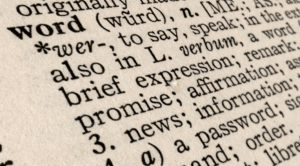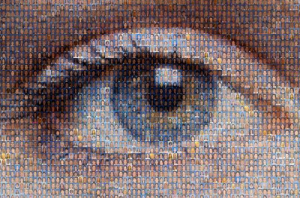
“Sticks and stones may break my bones…
but the words ‘stick’ and ‘stone’ are arbitrary stand-ins for physical entities, so ‘sticks’ and ‘stones’ really can’t hurt me,” may well have once been uttered on the playground by a young Friedrich Nietzsche. As speakers, as writers, as readers, as people with the capacity for thought, we are conducted through life on the backs of words, and so it is imperative we know just what we’re treading on when we consume and produce language–when we so much as invoke the word “word.” And if Nietzsche is right, then we’re treading on air.
A nineteenth-century philosopher, Nietzsche would rise to prominence as the curator of polarizing ideologies ranging from morality to epistemology, of which his essay “On Truth and Lies in a Nonmoral Sense” is of interest to any user of language. Briefly, his argument is such: All things posses “essence[s]” (Nietzsche 117). We are concerned primarily with the essences of things, and it is these essences that words attempt to name. Words are “metaphors”–arbitrary fabrications completely irrelevant to the essences of things–which cannot actually come any closer to describing the thing, yet are as close as we can get (Nietzsche 116). We then attempt to unearth cosmic truths via the flawed words created by us, and so continually deceive ourselves with language that will forever circumscribe the truth.
That is, language categorically bars us from truth, and language’s most atomic unit–a word–can merely serve to offset meaning rather than define.
Perhaps the affront to tangible reality that Nietzsche’s theory puts forth is its trivialization of the senses: What good are they when our perception of the world necessitates a language which obscures and mutates it anyway? A century after Nietzsche, Valentin Volosinov1 conceives a theory that similarly asserts the fundamental ambiguity of words, defining a word as that which is “multifarious” (“many-speaking,” from the literal Latin) (72). A word by nature cannot be static, and must possess multiple meanings; a ‘word’ with one single meaning transcendent of context would indeed cease to be a word, instead acting as a “signal2” akin to the red light of a stoplight indicating a STOP! command, or hearing a particular register of animal cry and instinctually recognizing it as ‘pain.’ A word may only be a word if its very definition is in flux; to utter one is to grasp at water.
While perhaps self-evident, it is critical to enunciate that reflection, critical thinking, premeditated action, or any sort of interpretation of stimuli is linguistic. Our most basic and most proximate tool for accessing reality is words, though they be as blunt and imprecise as the rock which clobbers an oyster to get at its delicate flesh. The very process by which words access reality distorts it indelibly.
I will describe schematically the fundamental wedge language imposes. Let A be an entity–something that exists–such as a tangible object or a concept. We can denominate the word assigned to it as A1, since it is not literally A, yet is its closest and most fundamental association. A implies A1 and vice versa. The problem is that, because we are conscious of language’s inherent multifariousness and fallibility as well as our own fallibility as its operators, we have learned through socialization that the linkage between A and A1 is not strict. For instance, suppose we were to predictably and concertedly meet for lunch every other day, and otherwise never run into each other due to distance. If I were to part by saying, “See you tomorrow,” you would not show up expectantly the next day; that is to say you would not interpret “tomorrow” literally, because you can deduce what I meant, and substituted the correct and appropriate meaning to “tomorrow.” Not only have you decoupled A (the concept of tomorrow) from A1 “tomorrow,” you have reassigned A1 to B (the day after tomorrow), based on your own assumption.
Not only do words lack inherent meaning or value, but also functional meaning by being so susceptible to alteration via misuse. As linguistic purists, we could obsess over the grammatical genocide of adverbs in colloquialisms (“man I did so bad on that test..”), or the loss of “fewer” (“there are less pigs than sheep”) and “spat” (“ew, you just spit on me!”) from social vocabulary–but such pedantic anal-retentivity is hardly the point. Extrapolate the above premise to a world cluttered by words, where we are constantly bombarded by a deluge of advertisements, news, electronic communications, face-to-face conversations, books, etc. where we prioritize efficiency over correctness, and are likely to be completely oblivious to the ramifications of certain linguistic choices, deliberate or not. Apart from the select scholar, who is yet still fallible, there is no language police. Invariably through careless use, words become diluted and adulterated, where A1 can come to mean essentially anything in different contexts. Any nonliteral interpretation can be seen as the degradation of language, and the mortal risk is that the original association between A and A1 can be completely lost (‘nice’ has lost all connotation of its Latin etymology, nescius, meaning “unknowing” or “ignorant”), words can sometimes mean their very antonyms (turn the light off, the alarm went off (on)), producing a nonsensical world. This is frightening, that we are all complicit in the confusion of our best tool to understand the world.
A precedent follows, then, for mistrusting language in an anxious and conspiratorial way, since we as its users have been denied, systemically, the very possibility of meeting the task we have employed language to perform. One reaction to Nietzsche would be to militantly interpret language at face-value in narrow and strict fashion–to rigorously excise language from all contextual and ideological connotation and so strip it down to its naked germ to come closest to reality. To do so would be to read apathetically, disengaging ourselves as readers from the equation. Granted, apathy here is relative–since utter apathy is robotic and therefore inhuman–so apathy to the extent that we may not allow ourselves to be moved emotionally by any particular line, but may still react on the whole. We will take Nabokov’s Lolita to investigate what Nietzsche’s paradigm means in practice.
Under this rule, we can explain Lolita’s acclaim as follows: the text on a literal level follows the narrative of a sexual deviant as he serially preys on an underaged girl. This text appeals to us the readers because it depicts an identifiable real-world phenomenon of which we either partake or do not, where the former enjoys self-recognition (the same comfort of looking into a mirror and indeed seeing oneself), and the latter enjoys the self-aggrandizement of alienating depravity. Both of these are narcissistic reactions in concord with Nietzsche’s assertion that man can only perceive the world in terms relative to himself, and fabricates the universe around himself at its core.
Nietsche’s claim about language should be troubling to the scientist or the historian whose fundamental purpose is to access truth. But literature for the most part is uniquely unbound in that it need not reconcile itself with truth in this way. If the sum total virtue of word was its capacity to describe the literal, word-play would not exist. Different forms of utterance would not exist, meaning no singing, no slam poetry, not even variable intonation in speech. If words meant only the things they intend to describe, we would need a cumbersome amount of them, or increasingly acrobatic ways to put them together, compounding the problem of the world-object gulf.
And we can show this to be untrue. Words are complexes of associations, networks of glowing neurons that trigger memories, feelings, sights, sounds, tastes, sensory experiences and recollections. Here stems the emotive force of language that transcends the literal.
As opposed to static definitions, words are artistic and mutable renditions of reality. Literature works to assemble fragments of disparate meanings, and, collectively, with all their various connotations and associations, form a homogenous picture (one big image made from smaller images).

What literary language–fine language–novelly introduces to words is aesthetic value, and in doing so obviates the need for words to have inherent value; their arbitrariness is then rendered no more bothersome than the arbitrariness of preference for chocolate or vanilla.
Lolita, light of my life, fire of my loins. My sin, my soul. Lo-lee-ta: the tip of the tongue taking a trip of three steps down the palate to tap, at three, on the teeth. Lo. Lee. Ta.
She was Lo, plain Lo, in the morning, standing four feet ten in one sock. She was Lola in slacks. She was Dolly at school. She was Dolores on the dotted line. But in my arms she was always Lolita.
These opening lines are beloved not for their word-for-word literality, but for their imagery and lyricism. Not only can what sounds good be good, but what sounds good is good because there are no dictums on aesthetic preference.
So why should we like Lolita, and regard it as exemplary? Because of its beauty. Because of its tragedy. And because the coincidence of the two in their juxtaposition are evocative. Beauty is to be sought. Tragedy is to be avoided. We are presented with an immanent dilemma in the very election to read on. Our interest is feed by the desire to know which force succeeds in the end, the pursuit of omniscience, to predict our own fates. Literature combats language’s failure by flinging the failure back in our face: the real world can only be represented by illusion, so literature employ illusions to manifest dream-worlds that overlap real-life such that we can easily conflate the two, and cyclically repeat the process until a dream-world has replaced whatever real-world existed originally. Literature trains us to be indifferent towards reality by interchanging reality with fictions. And so, once we are liberated from preoccupation with ‘real’ reality, we can make peace with language’s failure to touch it.
Language is an incantation. A conjuring. It is the summoning-spell of ideas and meanings, and like any good magic trick, it features the element of illusion. And this isn’t a defect.
- Russian linguist distinguished for championing the diachronic study of language.
-
Formal linguistic terminology bifurcating the linguistic sign into the phonetic/pictorial ‘signifier’ and conceptual ‘signified’. For more, see Ferdinand de Sassure’s influential Course in General Linguistics, on which Volosinov’s work heavily piggybacks.
Works Consulted
“Eye Made of Headshots.” Digital image. Picture Mosaics. Chan Excela, 11 Feb. 2016. Web. 15 Oct. 2016. <https://picturemosaics.com/photo-mosaic- tool/hotlink.phpfile=storage/s1/M9994582/ p0/pmt-thumb&e=jpg&s=1>.
“Word.” Sarah Mennel. On Words. Digital image. Odyssey. N.p., 29 Feb. 2016. Web. 15 Oct. 2016. <http://az616578.vo.msecnd.net/files/2016/02/29/635923654799611463-251196307_635921981639834124-997424637_word.jpg>.
Nietzsche, Friedrich. On Truth and Lies in a Nonmoral Sense. S.l.: Aristeus, 2012. Print.
Nabokov, Vladimir. Lolita. N.p.: Random House, 1997. Print.
Voloshinov, V. N. Marxism and the Philosophy of Language. Cambridge, MA: Harvard UP, 1986. Print.
